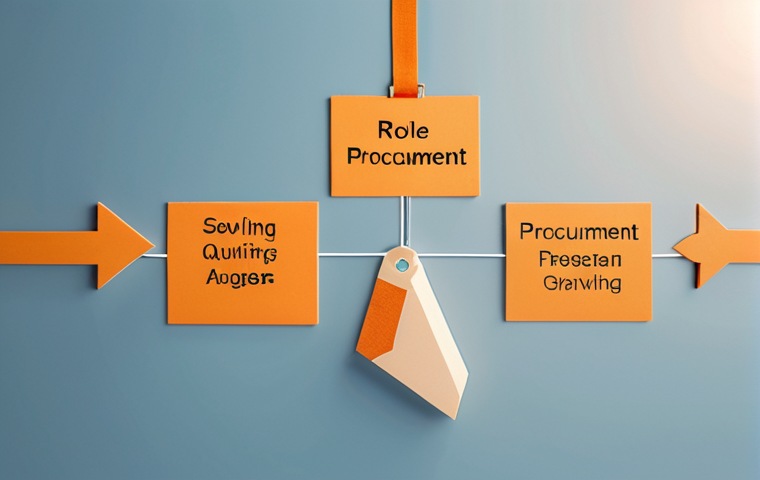Navigating the intricate world of global procurement today feels a bit like trying to solve a Rubik’s Cube blindfolded, doesn’t it? One moment you’re grappling with volatile shipping costs, the next it’s geopolitical shifts disrupting your entire supply chain.
I remember looking at the sheer complexity and wondering how anyone truly masters it. That’s precisely why pursuing an International Procurement certification isn’t just an option anymore; it’s practically a superpower in a world where supply chain resilience and ethical sourcing are no longer buzzwords, but bottom-line imperatives.
The procurement landscape has dramatically shifted. Forget the old notions of just ‘buying stuff.’ We’re talking about leveraging AI for predictive analytics, implementing blockchain for transparent tracking, and negotiating with suppliers across continents while keeping sustainability goals front and center.
This isn’t just about processes; it’s about strategic thinking, cultural acumen, and adapting at lightning speed. And honestly, the sense of accomplishment you get from truly understanding and contributing to this global dance is incredibly satisfying.
I’ve personally witnessed how a structured learning path can transform someone’s career trajectory, opening doors you didn’t even know existed. If you’re feeling that push to elevate your game and secure your place at the forefront of this dynamic field, then you’re in the right spot.
Let’s find out exactly what you need to know!
The Evolving Role of the Modern Procurement Professional

Gone are the days when procurement was merely a transactional function, tucked away in the back office, primarily concerned with processing purchase orders.
If you’ve been in this field for any length of time, you’ve witnessed this seismic shift firsthand. I certainly have. What started as an administrative role has blossomed into a strategic imperative, a vital nervous system for any organization operating in today’s complex global market.
We’re no longer just buyers; we’re risk managers, sustainability champions, technological integrators, and critical strategic partners. This evolution isn’t just a fancy narrative; it’s a profound change driven by factors like geopolitical instability, climate change, rapid technological advancements, and the ever-growing demand for transparency across supply chains.
The expectation now is that you don’t just secure the best price, but the best *value*, considering ethical implications, long-term supplier relationships, and innovative solutions that truly move the needle for your company.
It’s a demanding but incredibly rewarding space to occupy.
1. From Cost Center to Value Driver
The shift in perception of procurement from a necessary evil to a powerful value creator has been one of the most exciting transformations I’ve witnessed.
It’s about proactive identification of opportunities, not just reactive problem-solving. This means:
- Building robust supplier relationships that foster innovation and mutual growth, rather than just transactional exchanges.
- Leveraging advanced analytics to predict market trends and identify potential disruptions before they hit your bottom line.
- Driving significant cost savings through strategic sourcing, but also unlocking new revenue streams by collaborating with suppliers on new product development or market entries.
It’s a chess game, not checkers, requiring foresight, critical thinking, and a deep understanding of market dynamics.
2. The Imperative of Digital Transformation
Honestly, if you’re not integrating technology into your procurement processes, you’re already behind. This isn’t a future trend; it’s a current reality.
My own journey through various projects has shown me how critical tools like AI, machine learning, and blockchain are becoming.
- AI and Predictive Analytics: Imagine anticipating supply shortages months in advance, or identifying the optimal time to purchase raw materials based on forecasted price fluctuations. This isn’t sci-fi; it’s happening.
- Blockchain for Transparency: For industries battling counterfeits or demanding ethical sourcing, blockchain offers an immutable ledger, tracking goods from origin to destination. The peace of mind this offers, for both businesses and consumers, is invaluable.
- Automation of Routine Tasks: Freeing up procurement professionals from mundane tasks allows them to focus on what truly matters: strategy, negotiation, and innovation.
Embracing these digital tools is no longer optional; it’s fundamental to staying competitive and relevant.
Key Certifications That Truly Matter in Global Sourcing
When I first considered deepening my expertise in international procurement, the sheer number of certifications out there felt overwhelming, almost like wading through a dense fog.
“Which one truly holds weight?” I asked myself. “Which one will actually open doors and validate my skills in the global arena?” After much research and conversations with seasoned professionals, it became clear that while many programs exist, a few truly stand out, recognized globally for their rigor and comprehensive coverage of modern procurement challenges.
These certifications aren’t just about accumulating letters after your name; they’re about acquiring a robust toolkit, understanding best practices, and demonstrating a commitment to excellence that resonates with employers and partners worldwide.
They signal to the world that you’re not just capable, but truly dedicated to mastering the nuances of global supply chains and procurement.
1. Chartered Institute of Procurement & Supply (CIPS) Certifications
For many, including myself, CIPS stands as the gold standard in procurement and supply chain management. Their qualifications, ranging from Foundation to Professional Diploma, are recognized internationally and provide a structured path to expertise.
I found their emphasis on practical application and ethical considerations particularly compelling.
- Global Recognition: Holding a CIPS qualification immediately elevates your profile across continents.
- Comprehensive Curriculum: It covers everything from strategic sourcing and negotiation to legal aspects and risk management.
- Industry-Specific Focus: While broad, it allows for specialization, which is a huge plus in our diverse field.
It’s a serious commitment, but the return on investment in terms of career opportunities and knowledge gain is undeniable.
2. Institute for Supply Management (ISM) Certifications
In the North American context, particularly, the ISM certifications like the Certified Professional in Supply Management (CPSM) are highly regarded. I’ve seen countless job descriptions list CPSM as a preferred or even required qualification.
It’s often viewed as a testament to a deep understanding of supply chain fundamentals and strategic thinking.
- Practical Focus: The CPSM emphasizes real-world application of supply management principles.
- Strong Networking Opportunities: ISM’s network is vast, providing invaluable connections.
- Adaptability: Its core principles are applicable across various industries, making it incredibly versatile.
Both CIPS and ISM offer distinct advantages, often complementing each other, depending on your geographic focus and career aspirations.
Navigating the Certification Journey: What to Expect
Embarking on a journey to obtain an international procurement certification is a significant undertaking, and it’s natural to feel a mix of excitement and apprehension.
I certainly did. It’s not just about cracking open textbooks and memorizing facts; it’s about dedicating time, honing your understanding of complex concepts, and often, balancing it with your existing work commitments.
From my experience, preparing for these exams is less about rote learning and more about truly internalizing the strategic implications of every procurement decision.
You’ll find yourself dissecting case studies, engaging in robust discussions, and critically analyzing real-world scenarios. The process itself is transformative, pushing you to think more strategically and holistically about the global supply chain.
It tests your discipline, your problem-solving abilities, and your commitment to professional growth, ultimately shaping you into a more effective and confident procurement leader.
1. Study Methods and Resources
There isn’t a one-size-fits-all approach to studying, but I found a blended method to be most effective.
- Formal Courses: Many reputable institutions offer preparation courses, either online or in-person. These can provide structured learning and valuable peer interaction.
- Self-Study: Textbooks, study guides, and practice exams are indispensable. I can’t stress enough the importance of doing as many practice questions as possible – they truly highlight your knowledge gaps.
- Study Groups: Connecting with others on the same path can provide immense support, different perspectives, and accountability. I learned so much from discussing concepts with my peers.
Remember, consistency is key. Even dedicating an hour or two each day makes a huge difference over time.
2. Time and Financial Investment
Let’s be real: these certifications aren’t cheap, nor are they a quick weekend project. They require a significant investment of both time and money.
- Time Commitment: Depending on the certification level, you could be looking at anywhere from 6 months to 2 years of dedicated study. For me, balancing this with a full-time job meant early mornings and late nights, but it was absolutely worth it.
- Financial Cost: Fees vary widely, but expect to pay for course materials, exam fees, and potentially prep courses. In the US, a comprehensive certification like CPSM can easily run several thousand dollars when you factor everything in. Many employers, thankfully, recognize the value and offer tuition reimbursement. Always check with your HR department!
Consider this an investment in your career, not just an expense.
Beyond the Certificate: Real-World Impact and Career Growth
Obtaining a professional certification is a momentous achievement, a tangible recognition of your dedication and expertise. But the true magic, in my opinion, happens *after* you receive that certificate.
It’s not just a piece of paper; it’s a catalyst for real-world impact and accelerated career growth. I’ve personally seen how the knowledge gained translates directly into more confident decision-making, more effective negotiations, and a sharper eye for strategic opportunities within an organization.
It changes how your colleagues and superiors perceive you – you become the go-to expert, the trusted advisor in complex global sourcing challenges. This enhanced credibility can lead to exciting new projects, promotions, and even completely new career paths that you might not have envisioned before.
The confidence that comes with knowing you possess a validated skill set is empowering, allowing you to tackle more ambitious goals and truly make your mark.
1. Enhanced Credibility and Influence
One of the immediate benefits I felt was an undeniable boost in credibility. When you’re certified, it’s not just your word anymore; it’s backed by a recognized standard of excellence.
- Internal Recognition: Your colleagues and management will see you as a more authoritative voice in procurement discussions. This can lead to being entrusted with larger budgets, more complex projects, and leadership roles.
- External Respect: When negotiating with suppliers or interacting with external partners, a certification signals professionalism and deep expertise, often strengthening your position at the table.
It’s like having a universally understood badge that says, “I know my stuff.”
2. Opening Doors to New Opportunities
I’ve witnessed, both in my own career and among my peers, how certifications can unlock unforeseen career opportunities.
- Career Advancement: Certifications often become a prerequisite for senior procurement roles, supply chain directorships, or even C-suite positions.
- Industry Mobility: The validated skill set makes transitioning to different industries, which might have previously seemed daunting, much more feasible.
- Consulting and Entrepreneurship: For those who dream of striking out on their own, a strong certification provides the foundation of credibility needed to attract clients.
It broadens your horizons significantly, allowing you to shape your career trajectory rather than simply reacting to it.
Leveraging Your New Skills for Strategic Advantage

Once you’ve earned your international procurement certification, the real work, and the real fun, begins: putting that knowledge into practice to create tangible strategic advantage for your organization.
This isn’t about theoretical frameworks anymore; it’s about actively applying what you’ve learned to solve real-world problems and drive measurable results.
I remember feeling a distinct shift in my approach to challenges after completing my certification. I found myself thinking more critically about long-term implications, considering geopolitical factors that I might have previously overlooked, and developing more robust contingency plans.
It’s about transforming your perspective from operational oversight to strategic foresight. This new vantage point empowers you to identify untapped efficiencies, mitigate unforeseen risks, and foster innovations that directly impact your company’s competitiveness and bottom line.
1. Optimizing Global Supply Chain Resilience
In today’s unpredictable world, supply chain resilience is paramount. Your certification equips you with the tools to build truly robust systems.
- Risk Identification and Mitigation: Understanding global political economies, natural disaster patterns, and market volatility allows you to proactively identify and mitigate risks.
- Supplier Diversification: Beyond just having multiple suppliers, it’s about strategically diversifying your supply base across different geographies and economic zones to minimize dependency and single points of failure.
- Contingency Planning: Developing “Plan B” (and C, and D) for critical components, logistics routes, and payment systems becomes second nature.
It’s about building a supply chain that bends, but doesn’t break, under pressure.
2. Driving Sustainable and Ethical Sourcing
This is an area where certified professionals can truly make a difference, not just for their companies, but for the planet and society.
- ESG Integration: Integrating Environmental, Social, and Governance (ESG) criteria into supplier selection and contract management is no longer a niche concern; it’s a mainstream expectation from consumers and investors.
- Ethical Auditing: The ability to conduct thorough ethical audits, ensuring fair labor practices and responsible resource management throughout the supply chain, is a skill honed by advanced procurement training.
- Circular Economy Principles: Moving beyond linear “take-make-dispose” models to embrace circularity – designing waste out, keeping products and materials in use – is a strategic imperative that certified professionals can lead.
It’s about making procurement a force for good, aligning business objectives with societal responsibility.
The Financial Return: Is International Procurement Certification Worth the Investment?
This is often the burning question, isn’t it? After all the talk of strategic roles and digital transformation, what about the cold, hard cash? Is investing time and money in an international procurement certification truly going to pay off in your salary and career progression?
My personal take, having seen the trajectory of countless professionals (and experienced it myself), is a resounding yes. While the immediate return might not be a direct dollar-for-dollar match to your initial outlay, the long-term gains in earning potential, job security, and access to higher-paying opportunities are substantial.
It’s an investment in your human capital, one that consistently yields dividends in a competitive job market. Employers are increasingly willing to compensate professionals who can demonstrate a validated, comprehensive understanding of global supply chain complexities because these skills directly translate to significant cost savings, risk mitigation, and strategic advantage for the company.
1. Salary Growth and Earning Potential
Let’s talk numbers. While individual results vary based on experience, industry, and location, there’s a clear trend: certified professionals earn more.
| Certification Level | Average Salary Range (USD, Annually) | Key Benefits to Earning Potential |
|---|---|---|
| Entry-Level Procurement (No Cert) | $50,000 – $70,000 | Foundational roles, limited scope. |
| Certified (e.g., CIPS, CPSM) | $75,000 – $120,000+ | Enhanced strategic roles, project leadership, increased negotiation power. |
| Senior/Advanced Certified | $100,000 – $180,000+ | Director-level positions, global strategy roles, significant decision-making impact. |
This table gives you a snapshot, but it’s critical to remember that this upward trend compounds with experience and the ability to leverage your skills in high-impact roles.
The certification acts as a multiplier.
2. Increased Job Security and Marketability
In a fluctuating economy, job security becomes a prime concern. A certification can significantly bolster your position.
- Competitive Edge: When two candidates have similar experience, the one with a recognized certification often gets the nod. It signals initiative and commitment.
- Recession Proofing: Companies always need efficient supply chains, especially during challenging times when cost control and risk management are paramount. Certified professionals are essential for this.
- Global Mobility: With international certifications, you become a more attractive candidate for global roles, opening up career opportunities beyond your home country.
It’s about future-proofing your career in a dynamic global landscape.
My Personal Take: The Unforeseen Benefits of Certification
Beyond the obvious career boosts and enhanced skills, I’ve discovered a myriad of unforeseen, almost intangible, benefits from pursuing my international procurement certification.
It’s like discovering hidden compartments in a familiar piece of furniture – pleasant surprises that add unexpected value. The journey itself instilled a deep sense of accomplishment and resilience.
I remember late nights grappling with complex case studies, moments of frustration, and then the exhilarating breakthrough of understanding. This process built not just knowledge, but character.
More profoundly, it fundamentally altered my self-perception and how I approached challenges, both professionally and personally. It’s not just about what you learn, but how you grow through the learning.
The confidence that radiates from mastering a complex field, the expansion of your professional network, and the sheer joy of contributing at a higher level are truly invaluable.
1. Expanding Your Professional Network
I honestly didn’t fully appreciate the networking aspect until I was deep into my studies.
- Peer Connections: My study groups and online forums connected me with professionals from diverse industries and countries. These relationships have proven invaluable for bouncing ideas off, seeking advice, and even discovering new opportunities.
- Industry Leaders: Many certification programs bring you into contact with experienced instructors and guest speakers who are leaders in the field, offering insights and mentorship you simply can’t get from a textbook.
- Global Reach: The shared experience of pursuing a global certification instantly connects you to a worldwide community of like-minded individuals.
It’s like gaining an instant, high-quality professional family.
2. Boosting Personal Confidence and Problem-Solving Acumen
This was perhaps the most surprising benefit for me. The rigorous nature of the certification process truly sharpens your mind.
- Strategic Thinking: I found myself approaching problems not just with a solution in mind, but with a deeper understanding of root causes and long-term implications.
- Complex Decision-Making: The ability to sift through vast amounts of information, identify critical variables, and make informed decisions under pressure became significantly enhanced.
- Self-Efficacy: Successfully completing such a demanding program significantly boosts your belief in your own capabilities, spilling over into all aspects of your life.
It’s a transformation that goes beyond professional skills, enriching you as an individual.
Wrapping Up
Embarking on the journey to earn an international procurement certification is more than just an academic pursuit; it’s a profound commitment to your professional future.
It’s about arming yourself with the strategic acumen needed to navigate our increasingly complex global landscape, driving real value, and becoming a true leader in your field.
While the path demands dedication and investment, the profound impact on your career trajectory, earning potential, and even your personal confidence is unequivocally worth it.
This isn’t just about getting a piece of paper; it’s about transforming yourself into an indispensable asset in the dynamic world of global supply chains.
Useful Information to Know
1. Leverage Professional Networks: Beyond formal certifications, engaging with professional associations like ISM, CIPS, or local chapters offers invaluable networking, mentorship, and continuous learning opportunities.
2. Continuous Professional Development (CPD): Most reputable certifications require ongoing CPD to maintain your status, ensuring your knowledge stays current with evolving industry best practices and global trends.
3. Employer Sponsorship: Don’t hesitate to discuss certification aspirations with your employer. Many companies recognize the significant value these qualifications bring and offer tuition reimbursement or financial support programs.
4. Online Learning Platforms: Explore various online courses and platforms. They can provide flexible, cost-effective ways to prepare for exams, often offering practice questions and mock exams that simulate the real test environment.
5. Specialization is Key: As you progress, consider specializing in areas like sustainable sourcing, digital procurement, or risk management. Certifications can provide a foundation, but deep specialization can set you apart.
Key Takeaways
The modern procurement professional is a strategic value driver, not just a cost center. Digital transformation is non-negotiable for competitiveness and efficiency.
International certifications like CIPS and ISM are globally recognized gold standards that enhance credibility, expand career opportunities, and significantly boost earning potential.
This investment in professional development yields substantial long-term returns, enabling you to optimize supply chain resilience, drive sustainable practices, and become a more confident, influential leader in the global marketplace.
Frequently Asked Questions (FAQ) 📖
Q: Given the incredible volatility you described, how exactly does an International Procurement certification equip me to navigate the current chaotic global landscape, beyond just learning processes?
A: That’s a fantastic question, and it cuts right to the heart of it. From my perspective, it’s less about memorizing steps and more about building a robust, adaptable mindset.
Think of it like this: the certification doesn’t just teach you how to read a map; it teaches you how to anticipate the next earthquake, build a new road, and even find an alternative route if the original one collapses.
When I went through it, what really resonated was the emphasis on strategic foresight – understanding how geopolitical shifts in Eastern Europe might ripple through Asian manufacturing and impact container availability in North America.
It’s about leveraging AI for predictive analytics so you’re not reacting to a port shutdown, but proactively adjusting your orders weeks in advance. It truly cultivates the kind of critical thinking and creative problem-solving that lets you pivot with confidence, not panic, when the unexpected inevitably hits.
It’s a paradigm shift from being a buyer to being a global supply chain architect.
Q: You mentioned leveraging
A: I, blockchain, and sustainability. Can you elaborate on the practical, real-world application of these concepts that I’d gain, rather than just abstract knowledge?
A2: Absolutely, because that’s where the rubber meets the road, isn’t it? It’s one thing to hear buzzwords, another to actually use them. For instance, with AI, you’re not just understanding algorithms; you’re learning how to interpret AI-driven analytics to forecast demand surges or predict potential supplier risks long before they materialize.
I’ve seen firsthand how crucial this is – suddenly, you’re not just reacting to a stockout, you’re preventing it. With blockchain, it’s about far more than just knowing what it is.
You’re diving into its practical application for building truly transparent supply chains, something that becomes invaluable for ethical sourcing. Imagine being able to verify the origin and journey of every component, ensuring fair labor practices or sustainable material sourcing – that’s a game-changer for brand reputation and consumer trust.
And sustainability? It’s woven into every negotiation. You learn to embed environmental and social considerations into every contract, not as an afterthought, but as a core competitive advantage.
It’s about designing supply chains that aren’t just efficient, but also responsible and future-proof.
Q: You spoke about transforming career trajectories. What kind of tangible career opportunities or advancements should someone realistically expect after obtaining this International Procurement certification?
A: This is where it gets really exciting, because the impact can be profound. From what I’ve observed – and experienced myself – it’s not just about getting a promotion, though that often happens.
It’s about unlocking entirely new career paths and truly elevating your professional standing. Think of it: you’ll move from being perceived as a transactional ‘cost center’ to a strategic ‘value driver’ within your organization.
Doors to roles like Global Sourcing Manager, Supply Chain Strategist, or even Chief Procurement Officer start to swing open because you possess the holistic understanding of global economics, technology, and ethics.
Companies are desperate for people who can build resilient, transparent, and sustainable supply chains, and this certification signals you’re that person.
I’ve seen colleagues transition from regional purchasing roles to leading complex international projects, managing multi-million dollar contracts, and even relocating for incredible overseas assignments.
It genuinely makes you indispensable in a world that desperately needs experts who can navigate its procurement labyrinth. The confidence it instills, that alone is priceless.
📚 References
Wikipedia Encyclopedia
구글 검색 결과
구글 검색 결과
구글 검색 결과
구글 검색 결과






